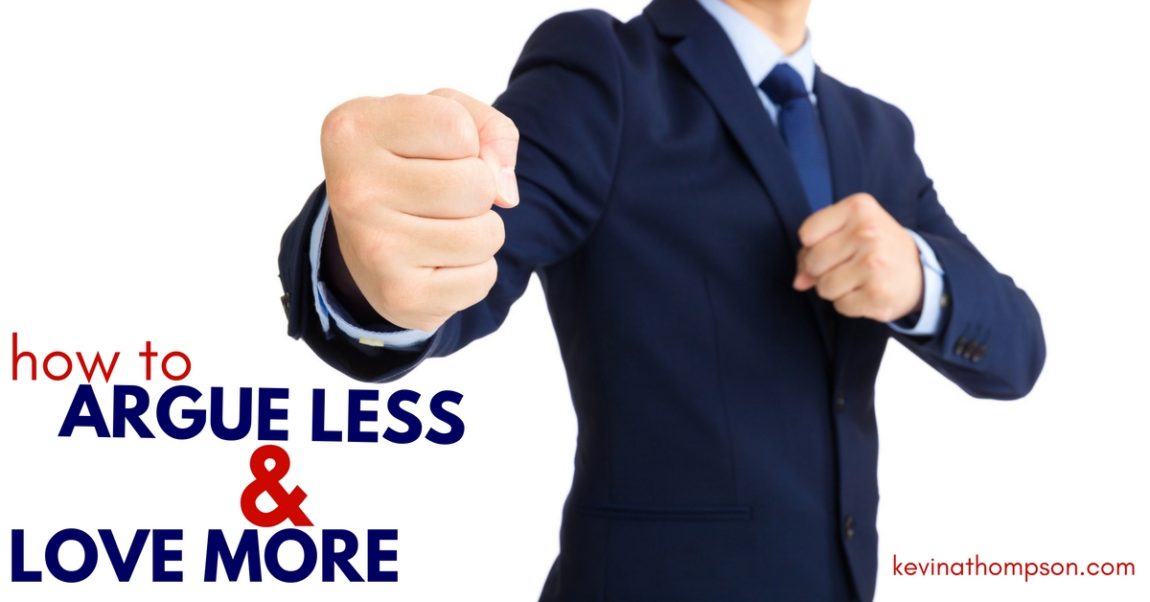Most people don’t want to argue. After engaging in a verbal sparring, whether in person or on Facebook, they regret it. They feel frustrated and alone. Very few people wake up of a morning thinking, “I hope to get into an argument today.”
But on many days, that’s exactly what happens. A co-worker says something and we respond before even thinking about it. We don’t like the tone of our spouse’s response and we jab back. Someone posts something on Facebook and three hours later we are pounding the keys with ever increasing force as we are trying to prove our point.
We live in a day of rage. What begins as minor and inconsequential disagreements quickly explode into time-consuming and emotionally raw exchanges. Friendships are broken. Marriages are strained. Work relationships struggle. And we forever dislike that friend we don’t even know on Facebook. (See: Refuse the Rage)
Thankfully, there is a better way.
Here is a simple technique to argue less and love more:
Ignore the first punch.
It’s counter-intuitive. We are well-trained to identify potential threats. At the first possibility we might be in danger, we naturally gather our defenses and protect ourselves. But what if we didn’t? What if in the normal course of events, if we ignored the first threat? What if we allowed the first punch to pass without punching back?
I would never recommend this in life or death situations. It’s a horrible military strategy. The police can’t implement this strategy. When our lives are on the line, we can’t hesitate.
However, when life or death isn’t involved, fight or flight is not a good response. Far more often than fighting or fleeing, we need to stay engaged with a person but do so with a soft kindness rather than to argue with the approach of a warrior. When the only real threat is a little awkwardness or feeling uncomfortable, we need to neither fight nor flee.
Instead, we should avoid our natural response by ignoring the first punch. The first time someone uses a tone we don’t like, says something that feels like an attack, or tries to take the conversation to a more contentious level, we should ignore it. Assume the best. Don’t respond defensively. Continue the conversation in the best way possible with the hopes that they won’t attack again.
Sometimes it won’t work. Having thrown the first punch without consequence, they will swing again and again. In those moments we can choose either to engage or exit. (See: How to Keep a Small Fight Small)
But far more often than we can imagine, people won’t throw a second punch. Our kindness and compassion will invite them into a different conversation. A light-hearted joke in response to their verbal jab will cause them to reconsider a better response. Staying on topic without heightening our tone to respond to their tone will invite them to soften their response. Refusing to punch back will make them consider that throwing punches may not be necessary.
I guarantee this approach will cut your arguments in half. A good number of fights–both online and in person–begin because one person unconsciously says something which feels like an attack and the other person responds in kind. The conversation escalates with neither party knowing how to lessen the tension. Both feel attacked and both are trying to defend themselves.
But what if you simply ignored the first punch–a tone you don’t like, a comment which is petty, a personal attack?
- What if you responded as though it didn’t happen?
- What if you ignored the tone and simply respond to the actual words which were said?
- What if you assumed they didn’t mean it and tried to soften than tone rather than hardening it?
- What if you turned the personal attack into a self-deprecating joke?
It wouldn’t prevent every argument, but it would transform many of them. It would allow you to stay on topic rather than making things personal. It would allow you to have more productive disagreements and conversations. It would make social media more fun.
Ignoring the first punch is not an act of cowardice; it’s an act of strength. It’s allowing the other party to truly consider if they want to engage in a negative way and it gives them a second chance to approach a topic in a more productive manner. (See: Don’t Fight With Your Kids)
There are times in which a punch must be returned with a punch, but more often than not it can simply be ignored.
Try it and watch how you will fight less and love more.




One Response to How to Argue Less and Love More